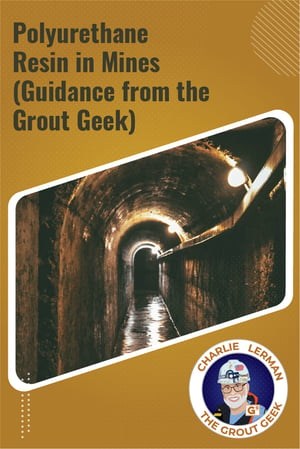
 Charlie Lerman, a.k.a. "The Grout Geek", is Alchemy-Spetec's Director of Technical Services - Leak Seal Division. The importance of waterproofing became critical to him while serving on nuclear submarines in the U.S. Navy. With decades of experience in construction and leak seal, Charlie commands unparalleled expertise in grouting techniques and water mitigation.
Charlie Lerman, a.k.a. "The Grout Geek", is Alchemy-Spetec's Director of Technical Services - Leak Seal Division. The importance of waterproofing became critical to him while serving on nuclear submarines in the U.S. Navy. With decades of experience in construction and leak seal, Charlie commands unparalleled expertise in grouting techniques and water mitigation.
The vast majority of grouting done in mines is cementitious. Only a fraction of it is done with chemical grouts. This is not because of the effectiveness of chemical grout but rather due to their higher cost. Chemical grouts have a long and successful history of use in mines.
Today I want to focus on a fraction of a fraction when grouting in mines: polyurethane chemical grouts. Or as I like to say, the grout for when all else fails.
So let us start with which urethanes are the go-to. The hydrophobic polyurethanes, both one and two-part, typically have better chemical resistance than the hydrophilic polyurethanes, thus they are preferred in mining applications. More often than not a rigid or semirigid grouts are selected as they have a high expansion factor to help minimize costs. Also, mines typically don't need to be 100% water-tight. Rigid polyurethane grouts in a crack or fissure may leak a bit after that crack moves but their ability to fill voids and stop high flows of even cold water make them more popular than their flexible counterparts.
Polyurethanes are normally used in high flow situations, used to shut off flows so cementitious grouting can continue, and in high salinity environments where sodium silicates cannot be used. They are field adjustable and have superior characteristics to most other types of grout, except when it comes to cost. The majority of polyurethanes are NSF-61 approved for contact with potable water, contain no VOCs, are inert when they cure, and only produce carbon dioxide while curing. Lastly, the leak seal pumping equipment is extremely low cost when compared to other mining and grouting equipment. The one Achilles heel of polyurethanes is their temperature resistance. They don't perform well over 165 F and are not fire-resistant, which precludes them in some applications.
In summation, when you need a hail mary for water control in mining, polyurethane chemical grouts come to the rescue at a premium - and they're worth it!


